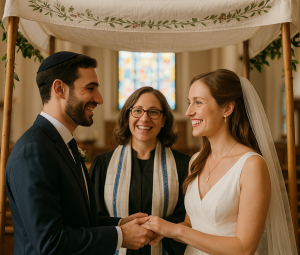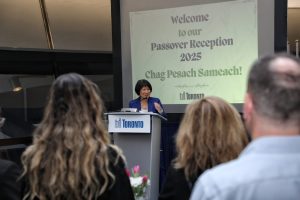TORONTO — The third annual Voices Forward Israeli and Palestinian cultural festival is presenting an interesting lineup of documentary films later this week, five of which are previewed here.
What I Saw in Hebron ( Nov. 16 at 11 a.m.), written and directed by Noit and Dan Geva, is on the 1929 mass murder of Jews in that West Bank town, a topic that still inspires fear and anger among Israeli Jews.
The film, which is having its Canadian première at the festival, is divided into three parts.
The first part is on the pre-massacre period, when Arabs and Jews seemed to have gotten along. The second segment examines the murderous rampage, which spelled finis to a venerable community for the next 38 years. The third episode is on the aftermath.
Judging by the comments of Jewish residents who lived there in the 1920s, Arabs and Jews were on friendly terms, and there were no political problems causing tension between the two communities.
“We had a great life in Hebron,” says one Jewish man.
By all accounts, Arabs had cordial relations with Sephardi Jews (who constituted the majority of Hebron’s Jewish population), but appear to have “hated” Ashkenazi Jews.
The Haganah, the pre-state Jewish army, warned the Jews of an impending pogrom, but the warning was ignored. They simply did not believe that they were in danger. Even some Arabs tipped off their Jewish friends.
To their detriment, the Jews did not realize that a false and malicious rumour had taken hold among West Bank Arabs that Jews in Jerusalem had killed thousands of Arabs in an orgy of communal violence.
The first of the 67 Jewish victims to be butchered was the chief Ashkenazi rabbi. He was among 67 Ashkenazi Jews to be killed that day in August.
It appears that many of the murderers, wielding axes, knives and swords, were from outlying villages rather than from Hebron itself. A few local Arabs risked their lives to save their Jewish neighbours.
Jewish survivors recall the frenzy, and old photographs portray the dead and the wounded. Survivors were brought to Jerusalem with only the clothes on their backs and chose not to speak about the massacre.
In the final segment, descendants of survivors return to Hebron on sentimental visits. Several issue a politically charged statement claiming that some Jews who settled in Hebron in the wake of the Six Day War did so for purely political reasons.
Which brings us to Micha Peled’s In God’s Bunker (Nov. 15 at 5 p.m.). Peled’s documentary unfolds against the backdrop of another massacre, perpetrated by Baruch Goldstein in February 1994, at the outset of the Oslo peace process. Goldstein, a Brooklyn-born opponent of territorial concessions, was himself pummelled to death after he killed 29 Palestinian Arabs at the Tomb of the Patriarchs in Hebron.
The Jewish settlers in Hebron, outnumbered by Arabs by 200 to one, are depicted as right-wing zealots who regard Goldstein as a hero and dismiss Arabs as expendable. Certainly, their views are carved in stone, as exemplified by the observation of one of their representatives. He asks: “What claim do we have to Tel Aviv if Hebron does not belong to us?”
Yet, as Peled points out, Hebron is a stronghold of Islamic fundamentalism, where 30 Jews have been killed since the Oslo talks were launched. In short, Hebron is a cauldron of hatred where Arabs and Jews are willing to kill for their respective cause.
Peled interviews few Arab inhabitants, which is a pity. By concentrating almost exclusively on extremist Jewish settlers, he draws only a partial picture of an explosive situation.
You, Me, Jerusalem (Nov. 15, 9.p.m), by George Khleifi and Micha Peled, focuses on an Arab-Jewish ambulance crew in Jerusalem and on Jews and Arabs who support coexistence.
The ambulance crew comes from all walks of life. Salam Da’ana is a physician who once treated Meir Kahane, the Jewish radical. At one point in the film, he is seen attending a Jewish wedding. Oranit Golken worries about ending up as an old maid. Eliahu Brand, a haredi, talks about the risks of entering hostile Arab villages. Dudu Ben Ezra recalls tending to an Arab terrorist who killed one of his friends.
The filmmakers also interview Jewish and Arab newspaper distributors who are old friends and a 15-year-old Jewish teen who works for peace.
You, Me, Jerusalem is a feel-good film with fine intentions, but it’s somewhat disjointed.
In Recognized (Nov. 16 at 5 p.m.), Ori Kleiner taps into a serious social and political issue, the problem posed by the existence of more than 40 Bedouin settlements in the northern Negev. These encampments are neither recognized by Israel, nor appear on official maps, and have no access to basic services. Indeed, the Israeli government is trying to demolish these flyblown settlements.
The Bedouin claim to these lands goes against Israel’s policy of concentrating Bedouins in urban centres. As the film opens with a shot of a bulldozer scooping up debris from a crushed building, Nuri al-Ukbi shouts, “You will not steal my land. This is my land!”
All the outraged Bedouins here complain of being treated like second-class Israeli citizens. One Bedouin who has been branded as a security threat wants his citizenship back.
The film Recognized opens to the door to a simmering problem that must ultimately be resolved, but regrettably, Kleiner does not present Israel’s point of view. He could have done so by interviewing Israeli officials whose mandate is to deal with unrecognized Bedouin villages.
Ashkenaz (Nov. 16 at 7 p.m.), directed by Rachel Leah Jones, looks at “whiteness” in Israel through the prism of Ashkenazi domination of Israeli society. Both Jews and Arabs have plenty to say about the topic, and some of their comments are quite harsh and unforgiving.
All films will be screened at the Royal Cinema on College Street, west of Bathurst.






